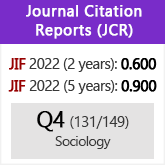What is a social norm?. A discussion of three analytical approaches
DOI:
https://doi.org/10.3989/ris.2009.02.17Keywords:
Cristina Bicchieri, Jon Elster, moral norm, quasi-moral norm, rational choice theoryAbstract
In this paper we compare the definitions of social norm proposed by standard Rational Choice Theory, Cristina Bicchieri and Jon Elster. We try to determine how similar or different they are. as long as they present some differences, we try to establish which captures better the very nature of the phenomena that we usually name “social norm” and which provides us with a concept (or concepts) more precise and productive and more easily useable in explicative models. In our opinion, Jon Elster’s classification between moral, quasi-moral and social norms is the more successful in this respect. In spite of the fact that Jon Elster does not plan to use their concepts in formal mathematical models with predictive purposes, there is not anything inherent in them which prevents this use. on the other hand, the precision of these concepts makes them especially useful to be used in social mechanism models which let us propose causal, informative and parsimonious explanations of real concrete cases.
Downloads
References
Aguiar, F. y A. de Francisco. 2009. “Rational choice, social identity and beliefs about oneself”. Philosophy of the Social Sciences 39: 547-571. http://dx.doi.org/10.1177/0048393109333631
Bicchieri, C. 2006. The Grammar of Society. The Nature and Dynamics of Social Norms. Cambridge: Cambridge University Press.
Coleman, J. 1991. Foundations of Social Theory. Cambridge (MA): Harvard University Press.
Elster, J. 1991. El cemento de la sociedad: las paradojas del orden social. Barcelona: Gedisa.
Elster, J. 2002. Alquimias de la mente. La racionalidad y las emociones. Barcelona: Paidós/El Roure.
Elster, J. 2007. Explaining Social Behavior. More Nuts and Bolts for the Social Sciences. Cambridge: Cambridge University Press.
Elster, J. 2009a. “Social Norms and the Explanation of Behavior”. Pp. 195-217 en The Oxford Handbook of Analytical Sociology, editado por P. Hedström y P. Bearman. New York: Oxford University Press.
Elster, J. 2009b. “Emotions”. Pp. 51-71 en The Oxford Handbook of Analytical Sociology, editado por P. Hedström y P. Bearman. New York: Oxford University Press.
Linares, F. 2007. “El problema de la emergencia de normas sociales en la acción colectiva. Una aproximación analítica”. Revista Internacional de Sociología 46:131-160.
Miller, D. T. y D. A. Prentice. 1994. “Collective errors and errors about the collective.” Personality and Social Psychology Bulletin 20:541-550. http://dx.doi.org/10.1177/0146167294205011
Sánchez-Cuenca, I. 2007. “Cooperar por principio.” Revista Internacional de Sociología 46: 11-35.
Ullmann-Margalit, E. 1977. The Emergence of Norms. Oxford: Clarendon Press.
Downloads
Published
How to Cite
Issue
Section
License
Copyright (c) 2011 Consejo Superior de Investigaciones Científicas (CSIC)

This work is licensed under a Creative Commons Attribution 4.0 International License.
© CSIC. Manuscripts published in both the printed and online versions of this Journal are the property of Consejo Superior de Investigaciones Científicas, and quoting this source is a requirement for any partial or full reproduction.All contents of this electronic edition, except where otherwise noted, are distributed under a “Creative Commons Attribution 4.0 International” (CC BY 4.0) License. You may read here the basic information and the legal text of the license. The indication of the CC BY 4.0 License must be expressly stated in this way when necessary.
Self-archiving in repositories, personal webpages or similar, of any version other than the published by the Editor, is not allowed.

















